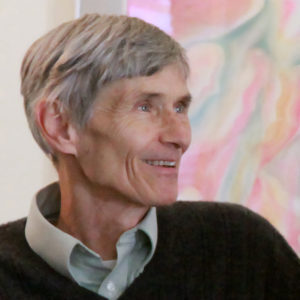A Path Towards Earth Stewardship
By Dennis Klocek 5 min read
If there is a potential benefit from the current health issues globally it might be that having a garden in your backyard now seems like a good idea. It’s interesting to muse over this trend as an evolutionary sequence for human beings.
To help do that, imagine a woman who is part of an aboriginal tribe digging in a sandbar to select cattail tubers to bake for the evening meal. Imagine her as she diligently hunts for the best spot to dig because she wants to gather the best quality tubers for her cooking. The intent of her will is the consciousness of a hunter and gatherer.
Now imagine a woman in a Whole Foods market selecting sweet potato tubers from the produce section. She wishes to bake sweet potatoes for the evening meal. She is diligently hunting through the produce to take home just the ones that she knows are of the best quality for her cooking. The intent of her will is the consciousness of a hunter and gatherer.
Now imagine a woman who runs a large truck garden and grows about ten acres of sweet potatoes for the market. She diligently seeks out only the best seed tubers and compost sources available so that she can be sure that the tubers that are gathered in from the fields are of the best quality. Even though she is giving vital service to many households, the intent of her will is the consciousness of a hunter and gatherer.
To expand these pictures out to a macro economic level the hunter/ gatherer consciousness has become the basis of the need/scarcity equations of a market economy. When something is seen as a perceived need, much effort is made to provide it. The supply side consciousness is driven by the intent of pulling into a gas pump and expecting there to be the best product available. In the health issues of the day this equation has centered on Can I get toilet paper or have the hunter/ gatherers before me depleted the supply? If so, I now experience the anxiety of market pressure.
In the context of the macro agricultural environment these thought forms are the basis for the input / output modeling of sustainable big business agriculture. There is a need, fulfill the need and move on to fill the next need. In the world today economic supply and demand thinking in all areas of life has replaced true social thinking. From an economic perspective the Earth is merely a resource that is either in supply or not. This diminishes the ability to see the Earth as a being with a spiritual destiny linked to the collaborative will and good intent of human beings.
From an economic perspective the Earth is merely a resource that is either in supply or not. This diminishes the ability to see the Earth as a being with a spiritual destiny linked to the collaborative will and good intent of human beings.
When economic thinking is the basis for social programs, humans lose their humanity and become simply human resources. The Earth, when seen economically loses its kinship to human soul life and becomes a dispensable commodity. If the Earth was a human this treatment would make it a slave, that is; a being with a spirit that is bought and sold as a commodity.
The traditional hunter / gatherer was fully aware of the spiritual dimension of the human activity of gathering the products that the Earth offered. Archaic religions were built on the premise that giving thanks to the spiritual reality of the Earth would insure the continued ability to harvest what was needed for the daily bread. In traditional society no market value was attached to the generosity of the spirit. Thanks were given as a religious gesture with the will to honor the Divine sources for their support. The thinking regarding nature was religious, not economic.
The difference between these two approaches to agriculture marks the path of Earth stewardship.
Imagine a woman who is the wife of a coffee farmer. Her family depends upon a half acre of coffee trees for their income and their food comes from her garden. She uses seed potatoes that she diligently selected from the best of her last year’s crop that she carefully stored over winter. Originally she inherited the potato seed from her mother. She knows that the quality of the food she needs to feed her family depends upon her knowledge of seed selection and saving to produce food of the best quality. The intent of her will is the consciousness of an Earth steward. She is not only interested in planting and gathering a crop for the table or market. Along with the seed she has inherited she has received an intent to unite her actions with the spiritual dimension of the plant moving invisibly from seed to seed. For that her vision must extend beyond supply and demand. She sustains the spiritual dimension of the plant through saving and using her own inherited seed.
From this perspective we can say that the intent in the will of a person working into nature creates distinct differences in the outcomes of the actions. We could say that the hunting / gathering intent is a kind of schooling of the will that links an action to an immediate outcome. That search filled the dinner plate. But in hunter/gatherer societies seed saving was a sacred task often requiring spiritual training in a clan of seed savers. To have an eye that goes beyond the immediate need is a spiritual deed that requires being united with the rhythms of the plants and the Earth in a much more conscious way. Through time these uniting rhythms of sowing, growing, selecting and saving and sowing again from the parent plant create in the soul a sense of the sanctity and mystery of life in the context of death and sacrifice.
To grow a garden has tremendous benefits not only for personal health but for the wellness of the atmosphere, waterways and soils of the living Earth itself. Economically less fossil fuel is used when a woman brings a potato into her home that she has grown in her own garden and over winters in a special place for grandma potato seed plants. Her vision must move beyond the evening meal and into a tradition of those who strive to not only work the Earth for gathering but to understand the spiritual dimensions of an Earth that is recognized as a living being.
The capacity to understand the life of the Earth is given to those who unite with the rhythmic cosmic cycles of growth and death that animate each growing season.
The capacity to understand the life of the Earth is given to those who unite with the rhythmic cosmic cycles of growth and death that animate each growing season and through the seed extend mysteriously into the next. The seed invisibly unites annual cycles of growth and death. Gardening into these mysteries provides an understanding of the inevitable growth and decay cycles of all things human, including economic systems. This diminishes economic anxiety.
Earth stewardship requires that the intent in the will of a human being move beyond gathering and begin to pay attention to the delicate time cycles that unite the heavens and the Earth. These cycles are the fundamental soul force and wisdom of nature. They represent a schooling of consciousness for humans who are being called to walk the path of Earth stewardship. This means to develop an intent in the will to go beyond hunting and gathering and enter into a progressive union by making agreements to act in harmony with the mysteries of the life of the Earth Spirit itself.

Dennis Klocek
Dennis Klocek, MFA, is co-founder of the Coros Institute, an internationally renowned lecturer, and teacher. He is the author of nine books, including the newly released Colors of the Soul; Esoteric Physiology and also Sacred Agriculture: The Alchemy of Biodynamics. He regularly shares his alchemical, spiritual, and scientific insights at soilsoulandspirit.com.
3 Comments
Leave a Comment
Similar Writings
The Heart of Clay
It has been said that by working the soil it is possible to do in a few years what would take nature thousands of years to accomplish. Intensive soil cultivation and the addition of proper soil amendments can aggregate sandy soil to give it more crumb or open heavy lime marls to give them more…

Backyard Farm an ecological landscaping company in Fort Collins has made a pledge to be a steward of the Earth. Thank you Dennis!!
Thank you Dennis! We met some ten years ago at a function at Eugene Waldorf School, being seated at the same table across from each other. Our little farm and garden has been providing most of our food for us all these years and yes, I save seeds and plant German Butterball potatoes from our saved seed potatoes that are planted on “fruit” days each year. They were not inherited but have been able to acclimatize themselves to our place now for more than a dozen years. I admit that on occasion I ask myself if I want to carry this on as the joys and rewards do ask for effort and dedication. The added perspective of this article provides welcome encouragement! Thank you.
I’d just been pondering and journaling about this—specifically gathering in the spirit of Earth Stewardship. My heart was full of questions about what it means to source something, especially for those who are not yet able or willing to provide it for themselves, and the desire and will to do so in a way that is not exploitative or extractive. I spontaneously clicked on this article and BAM—just like magic I find your words. The heart and will of Earth Stewardship. Thank you, Dennis. As always, deep gratitude for your work. Un abrazo fuerte ♥️